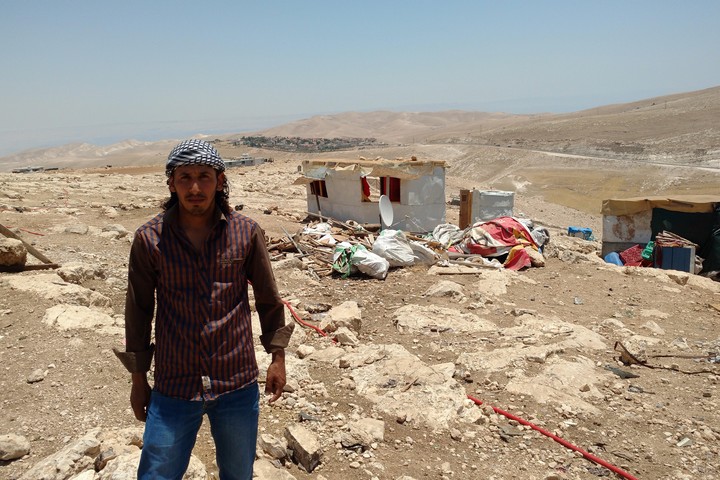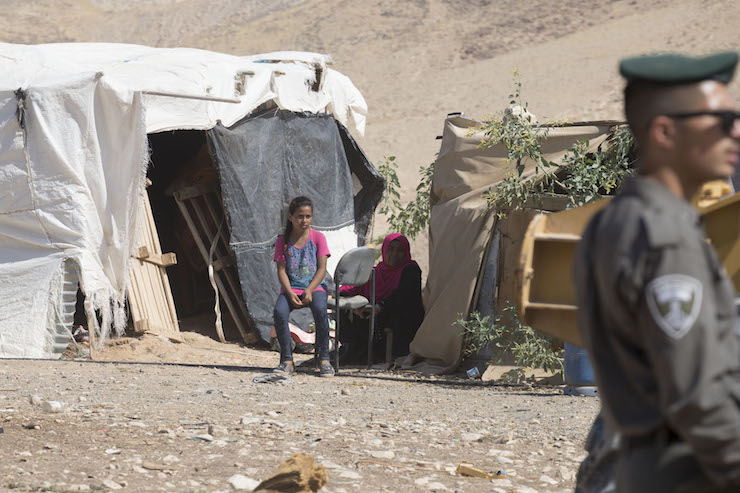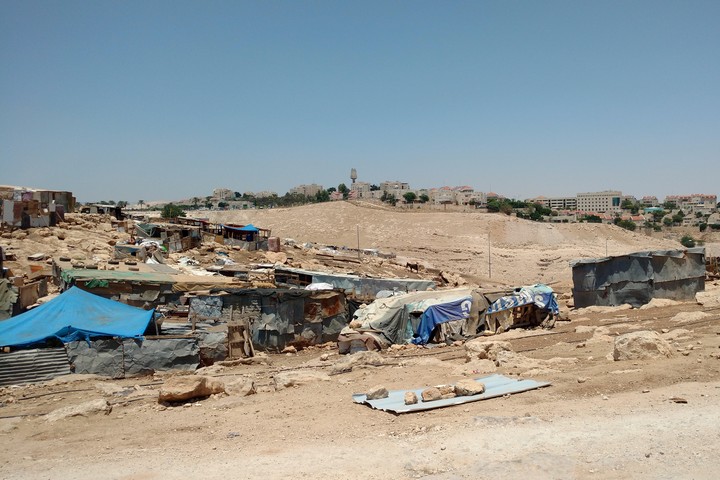While the media focused on Khan al-Ahmar’s nonviolent struggle against its destruction, Israeli authorities demolished 12 structures in a nearby Bedouin community, laying the groundwork for further evictions.

Israel is fighting a war of attrition against the Bedouin villages east of Jerusalem. And yet, despite the looming threat of wholesale demolition and eviction, the villagers can finally breathe easy, after the High Court of Justice night froze the demolition of Khan al-Ahmar until July 16. This, of course, is far from a victory; ever since the same court gave the green light to the demolition in May, the villagers have been counting the days until their expulsion.
Over the past few weeks, the village has been the site of activity by Palestinian, Jewish, and international activists, as well as security forces who have been preparing for the eviction. The IDF has declared the area a closed military zone — refusing entry even to diplomats — all while paving access roads that will eventually be used to carry out the demolition.
Things reached a boiling point last Wednesday, when security forces clashed with activists who attempted to block Israeli bulldozers. The village remained untouched, yet the destruction Israel is meting out against the Bedouin communities of E1 is simply a matter of time and place. While the media was focused on Khan al-Ahmar, the Civil Administration demolished 12 structures in the adjacent Bedouin village of Abu Nuwar, leaving 62 people — half of them children — without a roof over their heads, in the summer heat.
One of them is Harba Hamadin, a young construction worker, husband, and father to a one year old. Following the demolition of their home, the family moved in with his parents in a packed structure with another 15 people. His brother and cousin also lost their homes, as did their children, nine in total. All of the kids, says Harba, witnessed the demolition, and have been in a state of deep anxiety ever since. “The demolition orders are from three years ago,” he says as he stands by the ruins of his home. “I do not know why they came now. The attorney says they need to give a month’s notice, but they said nothing.” Like Khan al-Ahmar, the state wants to move the residents of Abu Nuwar to a garbage dump next to Abu Dis in East Jerusalem. “This will destroy our entire community,” Harba says. “That isn’t our land, and the area is too small and not suited for grazing.”
So what will you do, I ask. Will you rebuild despite the threat of demolition? “Does it look like we have another choice?” he responds.
The residents of Abu Nuwar are on edge after seeing what has been happening in Khan al-Ahmar, and they head over to the village every day to support their neighbors. They understand full well that the destruction of their own community is only a matter of time. Like in Khan al-Ahmar, Abu Nuwar is divided into clusters of families. The village school, like in Khan al-Ahmar, has been at the center of the Civil Administration’s demolition efforts. Since Israeli authorities destroyed the school in February, the children have been studying in makeshift structures. In the distance are the red-tiled roofs of the settlement Kedar, as well as the southern most neighborhood of Ma’ale Adumim.

“When they came to demolish we told them that we had a Supreme Court ruling to freeze the demolitions here,” says Abu Imad, who serves as the community’s spokesperson. “They said ‘we sent a fax to your lawyer a month ago,’ but our attorney says he never received a thing. One of the officers told the people here that the demolition is revenge for not going where they told us to, but I think they want to make noise to distract people and the media from Khan al-Ahmar, so that they come here. And many did come.”
“We are at a new stage. Now the state is in an open war with the Bedouin population here, in order to allow for the Greater Jerusalem plan,” Abu Iyad says, referring to Israel’s plans to build in E1, which would connect Ma’ale Adumin to Jerusalem, bifurcating the West Bank and putting an end to the two-state solution. Abu Iyad is involved in Khan al-Ahmar’s struggle, so much so that he was told about the demolitions in his own village as he was facing down the bulldozers in the neighboring one.
Despite the oft-heard criticism that the Palestinian Authority doesn’t care about these communities — at least before they won the attention of the international community — Abu Iyad has only good things to say about the PA’s involvement, and especially that of President Mahmoud Abbas. “The minister from the Wall and Colonization Resistance Commission is in Khan al-Ahmar every day, the minister for Jerusalem affairs was there a few times. All the Bedouin who lost their homes in the demolition have received assistance from the PA. They help rebuild homes, they provide legal aid, they help on water issues, health insurance.” A shy, young man vocally disagrees, saying that the PA made a lot of empty promises. Abu Iyad immediately chastises him. “So what do you want here? Islamic Jihad?”

On the way back from Abu Nuwar, we decide to visit Khan al-Ahmar, which has been subject to a kind of closure ever since security forces began laying the groundwork for its demolition. A police vehicle blocks the entrance to the parking lot, located on the road connecting Jerusalem and Ma’ale Adumim. “You can’t park here, this is a closed military zone,” says the police officer while waving the order. Why can’t journalists cover the preparations? We don’t receive an answer, and we’re forbidden from photographing the order itself.
Left with no choice, we drive around the makeshift checkpoint and reach the village using a dirt path, just a few moment after the police leave the area at 4 p.m, as they have done every day since their arrival. “Look at how precious Bedouin lives are to the government,” jokes Abu Khamis, the leader of the community. “Look at how many police officers we have protecting us! Even Netanyahu doesn’t get this kind of protection.”
With the imminent threat of demolition gone, the villagers can breathe a sigh of relief. So what do the villagers do here every evening, I ask. “Roll cigarettes and talk about the past, about what the Bedouin learns from the desert, which is mainly patience. Not like you,” Abu Khamis responds. He recently returned from a month-long trip to the United States, where he spoke at various events about the situation in Khan al-Ahmar. When someone asks him how received a visa, Abu Khamis retorts: “So the entire world can go to America, but when one Bedouin is allowed in you’re shocked?”
We sit, smoke cigarettes, and drink coffee while Abu Khamis analyzes the situation. “The state climbed a very high tree on Khan al-Ahmar, the question is whether or not it will be able to climb down. On the one hand, the settlers and the entire Israeli right want the village destroyed, on the other hand the entire world has become interested in our story, and is now putting pressure on the Israeli government.”
Can the High Court’s latest injunction be the ladder the state can use to climb down? “I think it’s way above the High Court’s head,” Abu Khamis responds. “This decision is coming from the highest echelons, from Netanyahu and Liberman. I think they will wait until the situation calms down and the media starts to lose interest. The activists will also go back to their lives. After all, how long can they leave everything and come stand with us? Then they will come evict us.”
The interest in Khan al-Ahmar is undeniable. A BBC news crew is filming a segment on the village, while Abu Khamis’ phone doesn’t stop vibrating. In the schoolyard, activists are wrapping up their daily meeting, while someone is holding a soundcheck before a performance by a Palestinian band set to take place later on in the evening. The village will soon start hosting a summer camp for children, since the residents fear that an empty school will be easier to demolish. A few activists spend the night in case the authorities decide to make a surprise appearance in the morning.
“I believe we need to tell the residents and activists the whole truth about the situation,” says Abu Khamis. “We must not lose hope, but we cannot be too optimistic. The eviction is still possible, and I do not want to cause people to believe otherwise, that they will break down if it happens. Until then we continue struggling, and we will thank anyone who comes to stand with us in this struggle.”
This article was first published in Hebrew on Local Call. Read it here.

